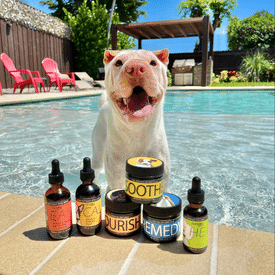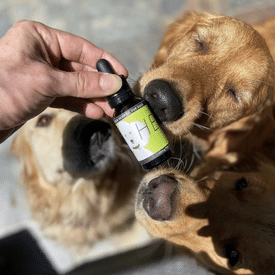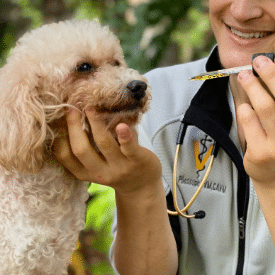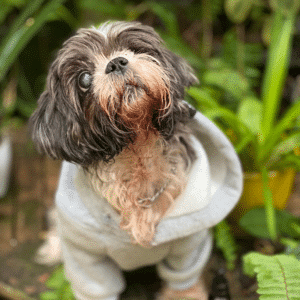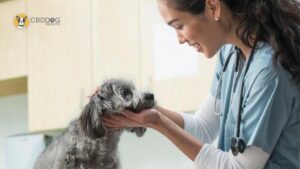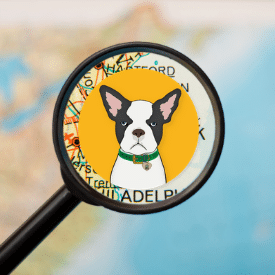Does CBD Cause Diarrhea?

Now that I have your attention, let’s talk about poop.
As a pet parent, diarrhea is basically an inevitability. In clinical studies, mild diarrhea was the most commonly reported side effect in dogs treated with hemp extract. There are many causes for loose stool, some serious and some just a temporary inconvenience. So what’s the story with CBD? Let’s take a closer look!
Table of Contents
Hemp & Poop
First of all, let’s be clear that CBD and Hemp extract is extremely safe for dogs and cats. Many studies have been done to test for adverse reactions to and all of them confirm the efficacy and safety of the plant.
In most cases, GI upset happens as a result of what our pets are eating. This can happen when your pup or kitten picks up something funky from the trash or makes a salad out of the front lawn. It can also happen when we introduce a new healthy food or supplement into their diet. Even if it’s safe, their gut may not process it well at first, so the response is to get it out as fast as possible.
Here’s some tips that will help you avoid a mess.
Tips & Tricks
If you know your pet has a sensitive stomach, make sure to administer your CBD at mealtimes so it’s not the only thing in their stomach.
Try using a higher potency tincture so you can use less oil for the same dosage. For instance, this tincture is 4 times as potent as this one, meaning you will only need ¼ the amount of oil to get the same mg’s of CBD.
Break up their dose into a couple applications a day. This will make it so there is less of an impact with each dose.

In a study by Colorado State University, the number of reported instances of GI upset with cannabis extract was about equal to the number of those reported in patients using an olive oil placebo. Think about how your body would react the first time you took a few shots of olive oil. In the end, your pet’s loose stool is more likely the body’s response to the oil, not the CBD.
One thing to consider is that animals eating a monotonous diet are more prone to GI upset when new foods and supplements are introduced. This is especially the case with dogs and cats who are eating a dry kibble diet and have been for years. Their digestive system has a very limited range of tools and coping mechanisms at its disposal because it has been conditioned to only process one kind of food for so long.
When Diet is to Blame
As always we recommend a varied, fresh and raw diet for the greatest resilience in the gut and overall health in our pets. One of the main benefits of changing up the protein and other parts of your pet’s diet is the gut learns to process new things more readily and is able to cope with change better. The more diverse their diet is, the more likely it is they will be unaffected by adding CBD oil into their regimen.
If you’re interested in switching your pet’s diet it’s important to do your research first and make the transition gradually. An abrupt change could turn a stream into a river if you know what I mean. A mudslide. An inescapable explosion of hot… Anyway.. Where was I?

If at any point you notice a major change in the color, consistency, or frequency of their bowel movements slow down the transition until their movements stabilize.
In the case that you can’t seem to get control of ‘the runs,” there are some specific things you can do to help. Consider adding some foods to your pet’s meals that have high soluble fiber and low acidity.
For dogs experiencing chronic diarrhea, Dr. Karen Becker recommends a temporary diet of cooked lean ground turkey and plain canned pumpkin. This is something you would give your pet during the time their stomach and digestive tract are upset and then transition them back off it when they are regular again. This kind of diet is described as a ‘bland’ diet, but your pet will love the taste of these foods.
Another thing you can look for are supplements like slippery elm. This super-food is a great soluble fiber that will help slow down the digestive action of the intestines. The fibers hang out in their gut and keep things from moving through before the body is able to break it down and extract the valuable nutrients. They also retain water and prevent further dehydration.
When our dogs at our rescue, Fire Flake Farm, get diarrhea, our director of operations and the founder of CBD Dog Health, Angela Ardolino turns to Dr. Harvey’s product, Runs Be Done. This great supplement contains a combination of natural whole foods that are high in soluble fiber and have a calming effect on the gut. It also conveniently lists both pumpkin and slippery elm in its ingredients!
Cannabis for Gut Health
Even with animals who are eating a varied and balanced diet, it is possible for them to experience some mild diarrhea after their first dose of CBD. Most of the time this happens once or twice at most and then never again.
Despite the rare possibility of a blowout, the benefits of CBD for the gastrointestinal system are pretty amazing. There are tons of cannabinoid receptors in the stomach and throughout the digestive tract making cannabis an awesome natural treatment for things like IBS (irritable bowel syndrome) and IBD (Inflammatory bowel disease).
Studies show that full-spectrum hemp extract is great for reducing excessive gastric acid, increasing blood flow to the stomach lining, and helping the lower esophagus prevent reflux.
In addition, anxiety and stress have been reported as major causes for irregular bowel movements, again making CBD a great treatment option for your messy pet.
When to be Concerned
In and of itself diarrhea is not particularly dangerous and usually goes away within a couple of days. However, depending on the cause it can point to more serious issues and infections that should not be overlooked.
Here are some things to consider when assessing the seriousness of your pet’s poops:
- Do they appear fatigued?
- Do they have a fever?
- Is there blood in the stool?
If these symptoms persist for more than a few days and especially if you detect blood in their feces, it’s a good idea to contact your veterinarian for help. These problems often indicate bacterial and parasitic infections or chronic diseases that if left untreated could really hurt your pet.
One of the main issues with chronic diarrhea is dehydration. This is especially dangerous for small dogs, so it’s important to know the signs that it is something safe and normal.
Here are a couple of ways to tell if your pet is dehydrated:
1. Check their Gums
Using your finger, apply pressure to your dog’s gums. If the coloring quickly returns to a normal pinkish tone, that is a sign they are adequately hydrated. If after you remove your finger it takes several seconds for the blood to return to the area, they are probably dehydrated.
2. Check their Skin
Pull the skin on the back of their neck up away from the spine. If it quickly rebounds back to its normal position, you’ve got a hydrated dog. If it takes more than a couple seconds for the skin to return to a natural resting position, it’s likely they’re dehydrated.
Sometimes, you may not know for sure what you are dealing with. If you’re not super familiar with your pet’s poops, it may be hard to tell when something has changed for the worse. The best defense is to become more familiar with what’s going on before it’s a problem. That way you can rule out danger when you pet’s stool is loose from having a healthy cannabis product introduced.
Like I said, most of the time a loose poop is just a sign that your pet’s body is coping with something new and needs a second to figure it out.
The effects of adding cannabis oil to your pet’s diet can cause some change, but it is not something you have to be worried about. In the end, the positive benefits for the gut far outweigh the short term reactions your pet’s stomach may have in response to a little bit of oil in their diet.
In the case that they don’t make it outside in time, our best friend is a bucket of soapy water and a little bit of patience.
Sources:
Slows down overactive Digestion:
https://www.ncbi.nlm.nih.gov/pubmed/11358910
Increased Bloodlow to stomach lining study:
https://www.ncbi.nlm.nih.gov/pubmed/17218765
CSU – Side Effects
https://www.ahvma.org/wp-content/uploads/AHVMA-2018-V52-CannabisAdverseEffects.pdf
Safety in Dogs and Cats
https://www.ncbi.nlm.nih.gov/pmc/articles/PMC6826847/

